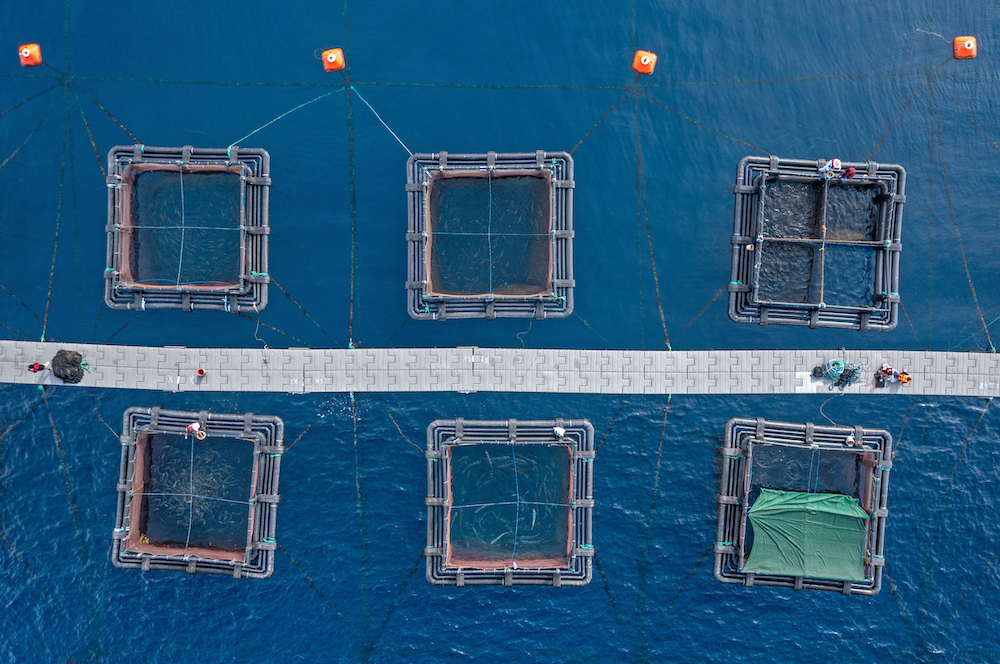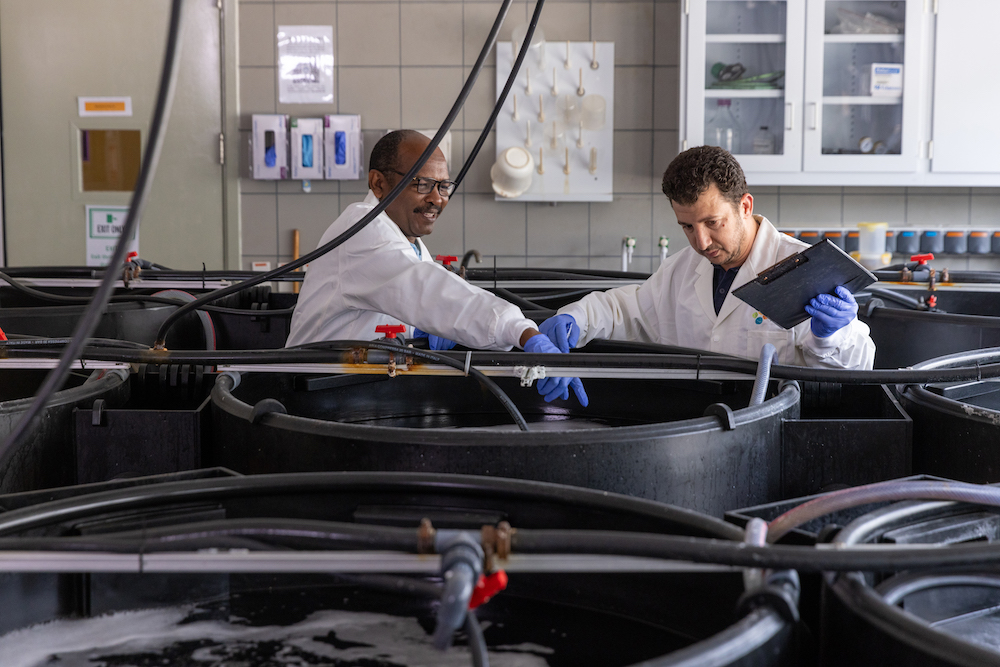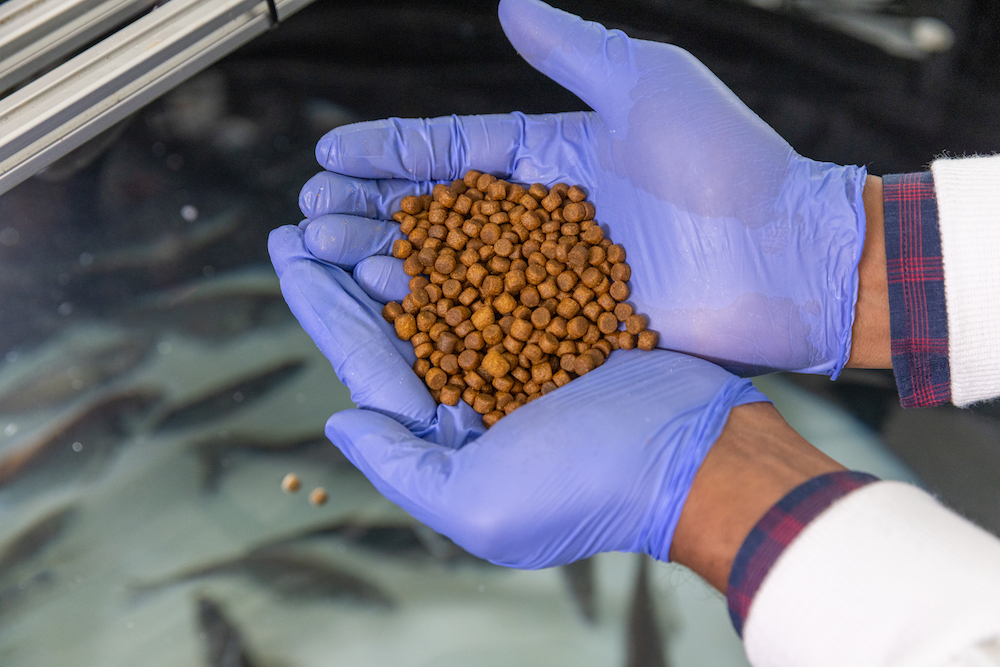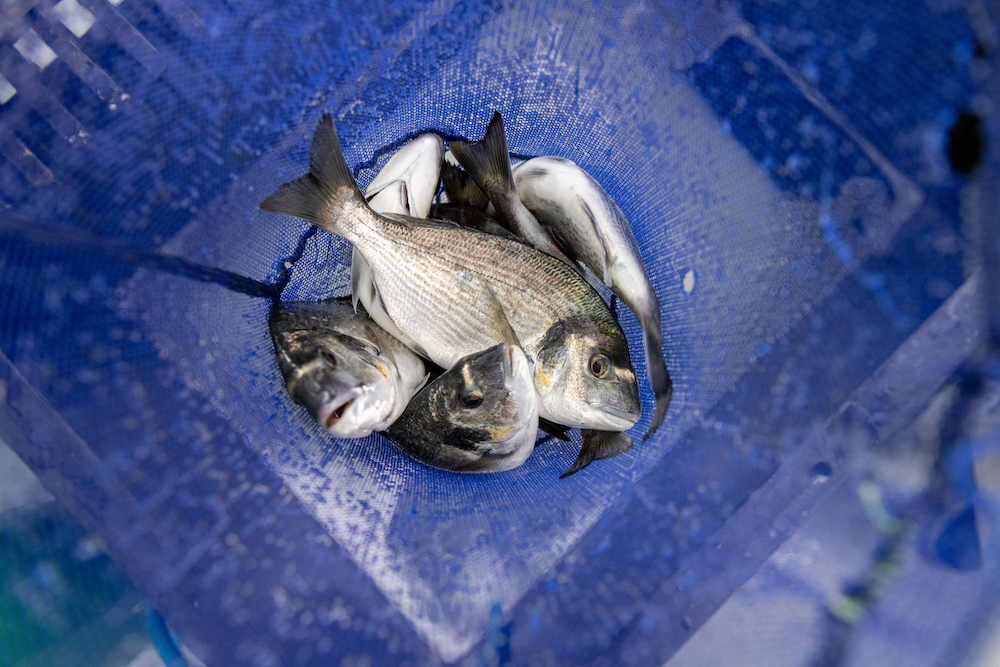KAUST Beacon Development, in coordination with MEWA, is on target to reel in an abundant supply of fresh local fish to transform the food economy of Saudi Arabia.
Off the coast of Saudi Arabia north of Jeddah, sixteen net enclosures float on the surface of the Red Sea, each one containing 216 cubic meters of seawater and teeming with thousands of healthy fish. The enclosures are part of an infrastructure of inland and offshore aquaculture research facilities that comprise the Aquaculture Development Program (ADP). KAUST Beacon Development (KBD), an environmental consultancy department within King Abdullah University of Science and Technology (KAUST), oversees this initiative in coordination with the Saudi Ministry of Environment, Water and Agriculture (MEWA).
On average, Saudis eat approximately 320,000 tons of seafood per year, but the industry only produces around 120,000. Aquaculture is a Vision 2030 initiative with huge potential as a source of fresh local food, with a goal to grow 530,000 metric tons (mt) of seafood a year by 2030. KAUST’s expected aquaculture contribution will be 280,000 mt a year by 2030, a goal to be reached through multiple and innovative objectives.

Providing a variety of locally available seafood for consumers reduces reliance on imported fish, increases the self-sufficiency of fishing communities, and provides jobs. Moreover, farmed fish relieves pressure from wild fish populations, helping them recover from overfishing and environmental stressors.
“Aquaculture is one of the fastest growing food sectors in Saudi Arabia at a rate of 6% annually,” said Dr. Ali Mohammed Alsheakhi, Director General of the General Directorate of Animal Livestock and Fisheries under MEWA. “An investment in aquaculture is an investment toward safeguarding the Kingdom’s food security and marine biodiversity while bolstering local livelihoods and business enterprise.”
Science-based stages for success
A key pillar in aquaculture development is sustainability. KAUST and MEWA are devoted to promoting and achieving sustainable aquaculture practices in KSA. Many components are needed for aquaculture to be successful in Saudi Arabia, which is why KBD is supervising the effort.
The KBD team — marine biologists, fisheries experts, fish nutritionists, technical engineers, research scientists and other specialists — use a range of techniques and expertise to map and understand the Red Sea environment to identify sites for the new farms, assess the environmental carrying capacity, and establish environmental thresholds and guidelines to be applied to the environmental monitoring of aquaculture operations.
They apply interdisciplinary knowledge at every stage of the cycle in areas such as fish breeding, behavior and fish physiology and handling; nutrition and animal feed formulation; on-land aquaculture closed systems and open sea cages; and environmental sustainability based on Red Sea conditions.

The fish are spawned and raised in two experimental hatchery facilities — the KAUST Coastal and Marine Resources (CMR) Core Lab, and the Jeddah Fisheries Research Center — where their water quality, diet, feeding and health are closely monitored. When the fish are bigger and healthier, they’re transferred to the net cages in the sea, where they’re grown to reach the desired marketable size. KAUST is partnering with KSA’s private sectors as well as international institutions in Europe (the Hellenic Center for Marine Research in Greece) and southeastern Asia (Eco Aquaculture in Thailand) using a system that simulates the Red Sea environment conditions called Recirculating Aquaculture System (RAS).
“The water is their home,” said KAUST Aquaculture Program Director Dr. Asaad Widaa, who’s served in this program since 2016. “Maintaining excellent water quality in the tanks is a top priority so the fish can live well, feed well, reproduce and thrive in their environments. Whatever controls and experimental tests we set for the lab trials we apply to the settings of the commercial cages to compare and validate our results and outcomes.”
Not all fish, however, are suitable for aquaculture. A key challenge for the team was to identify the species most likely to adapt to farming environments. For example, which fish could reproduce in confined culture conditions? Which ones could manage the transition from small, on-land tanks to commercial-scale sea cages? For this, the team, together with distinguished external consultants, conducted a species prospecting exercise, examining the science literature and available technologies suitable for each fish species to be selected for commercialization.
Widaa said they’ve made significant progress and are able to scale operations to reach the 280K goal, a success he attributes to the data and team’s science-backed approach. What started with a production of around 70 thousand metric tons of seafood and two species has grown to a production of around 160K to 170K mt and seven species — a mix of freshwater and marine finfish and shellfish: tilapia, whiteleg shrimp, Asian sea bass, gilthead seabream, sobaity bream, pompano and mangrove red snapper.
Five of the selected fish species are native to the Red Sea — sought for being adapted to the sea’s tropical, warmer water temperatures, fluctuating conditions and oxygen availability. Well-adapted fish grow faster, are more resistant to disease, and are healthier, in general, which yields shorter production cycles and quality food — traits that bring higher market prices and profits.

KBD fish nutritional experts have developed novel, quality feed formulas for the different targeted species, which, in and of itself, has been a hallmark achievement.
“We’ve created something that’s never existed before in KSA,” said Dr. Reda Salah Azam, senior aquaculture specialist at KAUST. “It used to be that one feed covered many different fish at all life stages. Now we’ve developed more than 30 new formulations based on the seven different species we’re testing with three to four different diets that cover different life stages.”
Bringing knowledge to communities
In addition to scaling operations for commercial success, capacity building is a key pillar of the program that aligns with national goals to enhance local communities.
To this end, KBD is establishing a network of aquaculture specialists and systems for local populations to manage and market the fish that they grow. The team is training young Saudis at all levels of the production cycle, giving them hands-on experience so they can be hired in the private sector or manage their own operations. Widaa said that many of the newly-trained professionals are currently working for KAUST or MEWA. KBD also proposes to deliver small-scale aquaculture systems to villagers to boost the income and livelihoods of local fisherman and make them self-dependent.
Dr. Ali Alsheakhi of MEWA further said, “KAUST has made significant headway toward realizing the Government’s aquaculture agenda with an approach that combines cutting-edge science research and development, program management and community involvement. MEWA fully supports and subsidizes these efforts. The future of aquaculture is looking bright.”
Related links
KAUST and MEWA host 2023 KSA Marine Finfish Nutrition and Novel Feed Formulation Forum and welcome two MoUs to expand aquaculture in the Kingdom
Are there really plenty more fish in the sea?
The future of algae _ a treasure trove of green for the Kingdom

